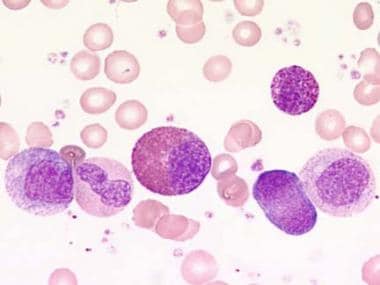Chronic Myeloid Leukemia (CML) is a type of cancer that affects the blood and bone marrow. It is characterized by the uncontrolled growth of myeloid cells, which are a type of white blood cell. CML is often associated with a specific genetic mutation known as the Philadelphia chromosome.
Overview: CML progresses slowly and is typically diagnosed in the chronic phase. However, if left untreated, it can eventually transform into a more aggressive phase called the accelerated phase and then into the blast phase, which resembles acute leukemia.
Symptoms:
- Fatigue
- Weakness
- Unexplained weight loss
- Fever
- Night sweats
- Enlarged spleen or liver
- Easy bruising or bleeding
- Bone pain
- Pale or sallow skin
It’s important to note that many of these symptoms may not be specific to CML and can be caused by various other conditions. A thorough medical evaluation is necessary for an accurate diagnosis.
Causes: The majority of CML cases are associated with a genetic abnormality called the Philadelphia chromosome. This chromosomal rearrangement results in the fusion of two genes, BCR (breakpoint cluster region) and ABL (Abelson proto-oncogene). This fusion gene, known as BCR-ABL, produces a protein that promotes uncontrolled cell division and leads to the development of CML.
The exact cause of the genetic mutation leading to CML is not well understood. However, certain risk factors, such as exposure to high doses of ionizing radiation, may increase the likelihood of developing this condition.
Treatment:
- Tyrosine Kinase Inhibitors (TKIs): These drugs, such as imatinib, nilotinib, and dasatinib, target the BCR-ABL protein and effectively control the growth of leukemia cells. TKIs are the primary treatment for CML and are often taken orally.
- Stem Cell Transplantation: In some cases, particularly when TKIs are not effective or if the disease has progressed to an advanced stage, a stem cell transplant (also known as a bone marrow transplant) may be considered.
- Chemotherapy: Though less common than in the past, chemotherapy may still be used in certain situations, such as during the blast phase of CML.
Prevention: Since the exact cause of CML is not well-defined, prevention strategies are challenging to establish. However, avoiding exposure to high doses of ionizing radiation and certain chemicals may reduce the risk. Regular medical check-ups and screenings can also help in the early detection and management of the disease.
It’s crucial for individuals with potential risk factors or symptoms associated with CML to consult with a healthcare professional for a thorough evaluation and appropriate management. Early detection and effective treatment can significantly improve outcomes for individuals with chronic myeloid leukemia.

































